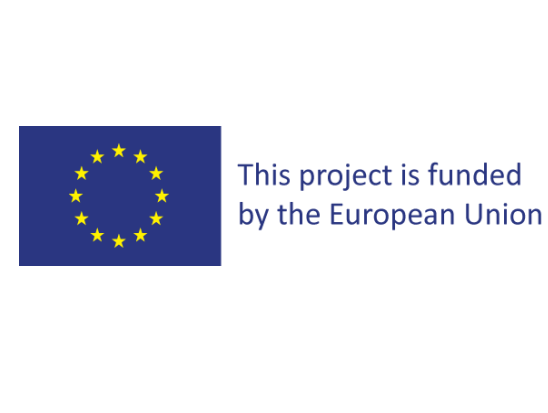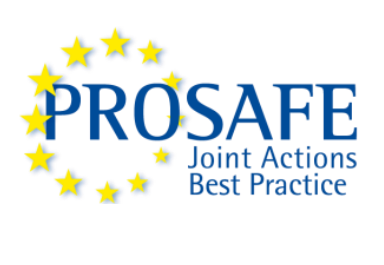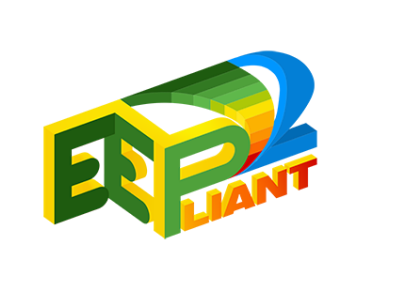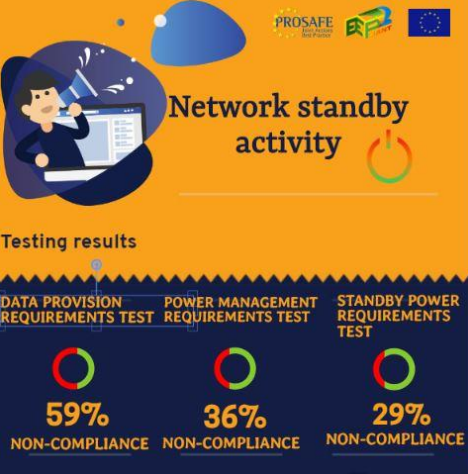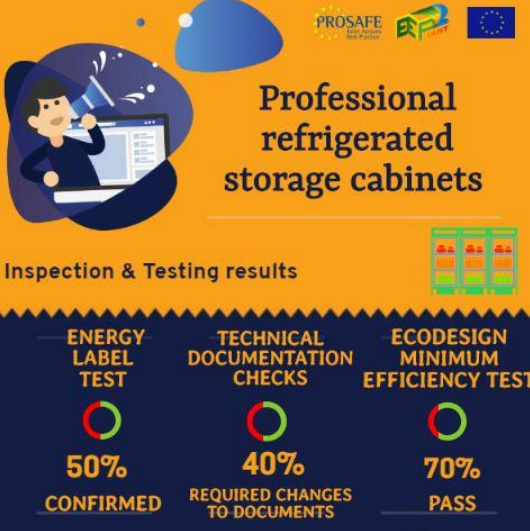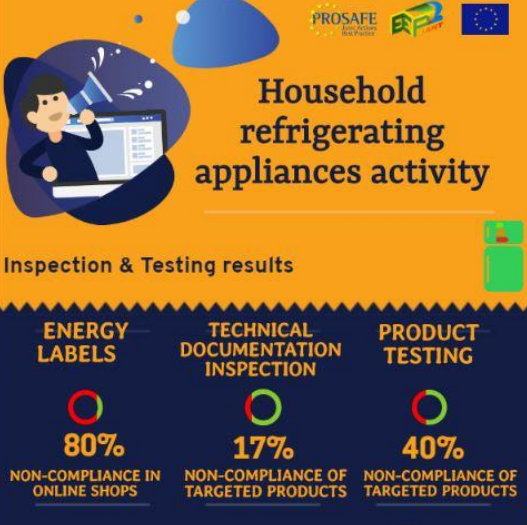This was achieved through the joint monitoring, verification and enforcement activities of 17 Market Surveillance Authorities (MSAs) and a national agency from Austria, Bulgaria, Denmark, Finland, France, Germany, Ireland, Latvia, Lithuania, Luxembourg, Malta, the Netherlands, Portugal, Slovenia and Sweden.
For 30 months, project participants reviewed the technical documentation and tested the energy performance of household refrigeration appliances, professional refrigeration products, and the energy consumption resulting from appliances on network standby. In all cases economic operators were given the opportunity for clarifications and voluntary actions.
The final results revealed non-compliance issues in 40% of household refrigerators, 79% of professional refrigerators, and 80% of network stand-by related products tested. The non-compliance rates described for individual product categories are not necessarily representative of the situation on the market, because MSAs targeted also the products that are more likely to be non-compliant. However, many participants were surprised and concerned by the high level of non-compliance found across the three product groups.
“In the Household Refrigerating Appliances category alone, EEPLIANT2 estimates for 2020-2030 cumulative energy savings of 775 GWh primary energy and savings of € 75.6 million that European citizens would have spent on excess electricity thanks to EEPLIANT2.” — Ioana Sandu, Project Coordinator, PROSAFE
The final project results, the lessons learned and the enforcement measures taken by the EEPLIANT2 participants were presented and discussed during the project Final Conference held on 4 February 2020. A Brainstorming Workshop co-organised with the European Commission on 5 February 2020 provided a further opportunity to the MSAs concerned to explore the underlying causes of the identified non-compliances and to discuss possible remedies.
The EEPLIANT2 project was funded by the European Union under the Horizon 2020 framework. The Project Coordinator is PROSAFE – The Product Safety Forum of Europe.
Household Refrigerating Appliances:
Different types of refrigerators and freezers and their combinations were selected and reviewed against the ecodesign, energy labelling, and online labelling regulations, including document inspections, product testing, and efforts to detect potential circumvention.89 online shops were reviewed for proper label display in 10 EU countries combined. 80% of them were regarded as noncompliant, with 34% showing no energy labels at all.
The technical documentation of 172 products was inspected, reviewing over 50 parameters. 61% of models had some issues in the technical documentation,17% of models were eventually considered as non-compliant after communication with economic operators.
43 home refrigerator models were tested in an independent accredited laboratory, 40% of the targeted models were considered as non-compliant.
So far, 79 economic operators have taken/are taking action to correct their product's technical documentation or correct the e-shop information, while 17 models were withdrawn from the market, penalty fines were imposed in 8 cases. No cases of use of circumvention software or test manipulation were detected.
“Improving products’ compliance on energy labelling and ecodesign is a shared responsibility among the Member States, the industry and the European institutions. This is exactly why projects such as EEPLIANT2 are so important.” — Inge Bernaerts, Head of Unit C.4, DG ENER - European Commission
“The persistent and consistent nature of failures identified suggests that further action should be taken to significantly improve compliance rates on the market.” — Emma Olsson, Work Package Leader, Swedish Energy Agency
Professional Refrigeration Products:
EEPLIANT2 reviewed the technical documentation of 64 professional cabinet refrigerators. Technical documentation review included over 50 parameters and authorities requested changes to declared data (including label classes and duty ratings) in 40% of reviewed cases. 29 models were tested in an independent certified laboratory.“In Technical documentation checks only 10% of cases passed in every respect. The majority of failures were due to failing to provide simple specified information: nearly half failed to state the refrigerant charge; 40% failed to state precautions to optimize energy efficiency; several did not declare the kWh/day energy consumption value.” — Franz Zach, Work Package Leader, Austrian Energy Agency
For lab testing, 79% of models tested failed in a significant respect. For 15 cabinets (52%), the measured energy consumption was higher than that declared by more than the prescribed verification tolerance. Over half were found to have a measured internal volume significantly smaller than the declared value.
Enforcement actions are on-going against non-compliant products; several models have already been removed from the market and 7 penalty fines were imposed.
Network standby:
The EEPLIANT2 project inspected the multi-product sector "Connected Equipment Products" covered by the Network Standby and the External Power Supplies regulations. Similar to the other products, the actions undertaken included document inspection, screen testing and full-scale testing. Examples of product categories reviewed include complex set top boxes, routers/modems, coffee machines, home theatre systems/ speaker systems, game consoles, robotic vacuum cleaners, laptops/notebooks.Out of 59 products tested, 80% had some compliance issues, e.g. 59% in data provision requirements, 36% in power management requirements, and 29% standby power requirements.
“Thanks to the EEPLIANT2 project, our knowledge and experience on network standby has improved considerably. However, more needs to be done, if we want to recover the significant lost energy in this product sector." — Tim Stokes, Work Package Leader, Sustainable Energy Authority of Ireland
Best Practice and EU added value
EEPLIANT2 improves the harmonisation of market surveillance across Europe by strengthening cross-border coordination and collaboration and by sharing best practices and intelligence. To this end, the project developed a Best Practice guideline and toolkits with templates and other documents to help increase the efficiency and effectiveness of market surveillance on eco-design and energy labelling. These were made available to all authorities across the EU, therefore benefiting also those who may be less experienced in the specific technical area or product sector.EEPLIANT2 has been designed not only to support Member States in verifying energy consumption of hundreds of specific products found on the EU market, but also to facilitate cooperation with key market players and stakeholders, such as industry and consumer associations, in order to increase awareness and achieve overall higher rates of compliance with the EU eco-design and energy labelling requirements. This project builds upon the work of EEPLIANT2014 that had assessed the energy consumption of LED lamps, heaters and printers and verified their compliance against the energy efficiency related requirements. The efforts continue within the ongoing EEPLIANT3 Concerted Action, where authorities and organisations from 20 EU Member States and Turkey will inspect and test air conditioners and comfort fans, tumble dryers, water heaters, ventilation units, lighting, and local space heaters.
Donation of 76 tested and still functional products
With sustainability at the core of its strategy and plan, EEPLIANT2 so far donated 76 of the products tested to charities and public bodies in Brussels. All items donated will proudly bear the EU funding emblem to acknowledge the EU contribution.eepliant.eu
Related tags: refrigeration
